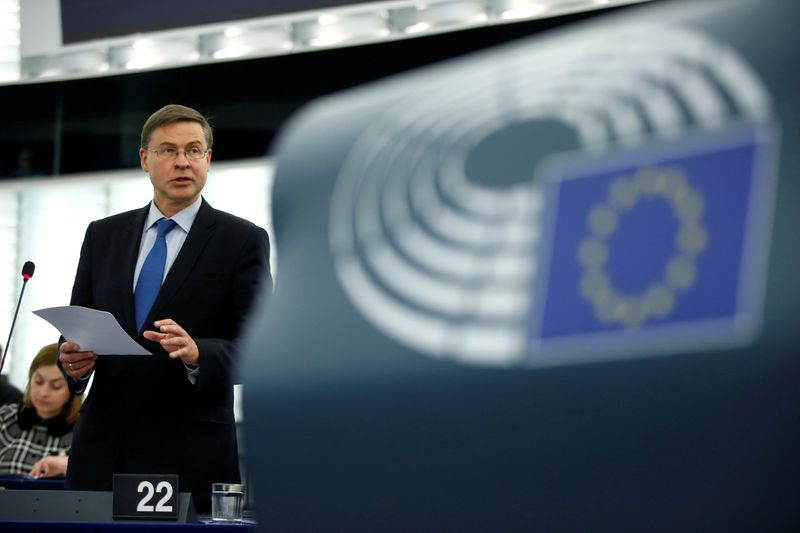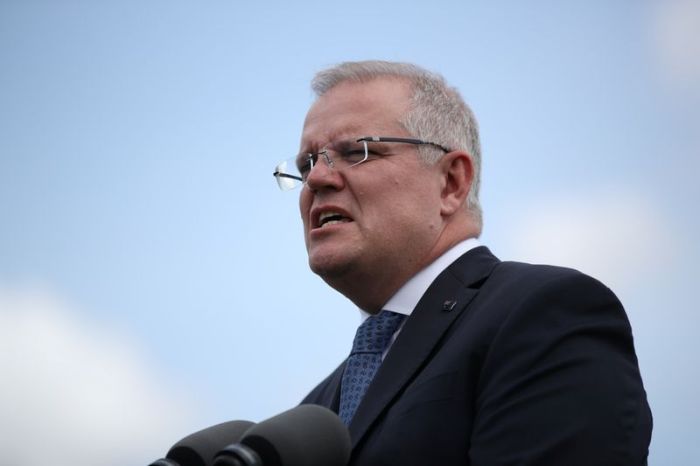LONDON (Reuters) – EU banks are to receive more capital relief so they can help companies struggling in the coronavirus pandemic, without having to make crippling loan provisions to reflect a looming deep recession, sources said on Monday.
The bloc’s financial services chief Valdis Dombrovskis is expected on Tuesday to propose that the EU “emulate in some form” a move by the U.S. Federal Reserve to allow banks to ease how they calculate their leverage ratio, sources familiar with the package said.
The ratio is a yardstick of solvency that measures capital against total assets on a non-risk-weighted basis.
The Fed proposed that until March 2021 banks do not have to include holdings of U.S. government bonds and deposits parked at the central bank in their assets tally for calculating the leverage ratio.
This would free up their balance sheet to offer more loans to companies during the pandemic.
The EU package comes on top of regulators allowing banks to tap some of their buffers to ensure continuity in lending.
Bankers said there could be political opposition to excluding government debt, even on a temporary basis.
Europe’s biggest banks collectively had 790 billion euros ($856 billion) in deposits with the European Central Bank at the end of 2019, and holdings worth 830 billion euros in government debt on their balance sheets.
Excluding both holdings would increase the headroom of the average leverage ratio, at around 4.85%, by 80 basis points, the sources said.
The European Banking Federation (EBF), an industry body, said in a letter to Dombrovskis on Monday that such changes to the leverage ratio would allow banks to help support the significant increase in bond issuance by EU governments to pay for economic recovery.
The state-guaranteed portions of coronavirus-related loans from banks to companies in the pandemic could also be excluded from the leverage ratio, the EBF letter seen by Reuters said.
LOAN LOSS RELIEF
Dombrovskis is also expected to propose relief from an accounting rule for loan loss provisioning, the sources said.
The rule known as IFRS 9 forces banks to set aside some provisioning at the start of a loan and more later on if there is a risk of default, which for many corporate borrowers has become more likely as the pandemic shuts down swathes of economic activity.
Provisions translate into reductions in a bank’s capital buffers.
Under current rules, banks that had decided before the pandemic to apply the new rule in full are not allowed to switch to an alternative, phased-in approach that offers temporary relief of up to 70% on the capital hit from provisioning.
The EU package would allow banks to switch to the phased-in approach, the sources said. It could also raise the relief to 100%, as proposed by the global Basel Committee that sets bank capital rules.
Some of the changes would be approved under the EU’s “fast track” legislative system.
A separate decision by Basel to delay by a year a set of new bank capital rules is also likely to be endorsed by Dombrovskis, the sources said.
“Whatever comes out tomorrow is likely to be targeted specifically at COVID-19, time limited, low risk in nature and consistent with changes suggested by other jurisdictions,” said Michael Lever, head of prudential at the Association for Financial Markets in Europe.
Banks in Europe are expected to report higher provisions in upcoming first-quarter earnings due to the impact of national lockdowns on companies.
Dombrovskis is also expected to propose bringing forward new rules that allow banks to offset the value of software against capital requirements, the sources said.
The European Commission declined to comment on the package.
(Reporting by Huw Jones; Editing by Louise Heavens/Hugh Lawson/Susan Fenton)





















